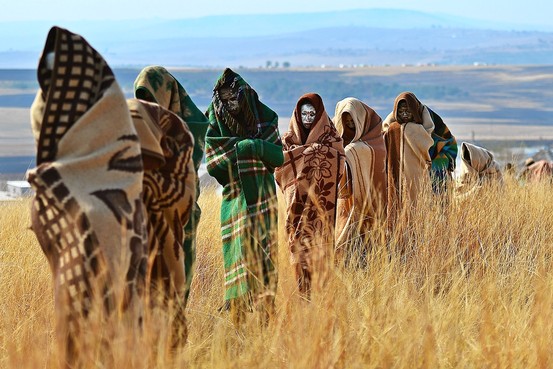Initiation Rites
Initiation rites are ceremonies performed when people take on a new role in life. In various parts of Africa, such rites may usher individuals into adulthood, secret societies, or positions of leadership. They are one of several types of rites of passage—the ceremonies that mark a person's progress through the stages of life.
Initiation rites vary from one society to another, but they do share some characteristics. They usually involve a temporary separation from the community, a symbolic change, and then a return to the community. During the ceremonies individuals often receive some secret knowledge or new privileges or power. Although the rituals are deeply rooted in tradition, they do change over time, sometimes in response to circumstances. In the late 1800s, missionaries banned one of the initiation rites of the Bemba of ZAMBIA. The people continued the practice, but they shortened the ritual, omitted some events, and added modern dances to the traditional celebration.

Types of Initiation Rites
Rituals celebrating the beginning of adulthood are probably the most widespread type of initiation rites in Africa. They mark the end of childhood and instruct young people in their responsibilities as adults. Among the Bemba coming-of-age rites may last for a month and include secret sayings and special songs and dances performed in the woods and in an initiation house. Different societies see adulthood beginning at different ages. For the Gusii of KENYA, the passage from childhood to adulthood occurs at age 8, while the MAASAI of Kenya and TANZANIA initiate youths between ages 15 and 18. The TUAREG of the Sahara celebrate the first time a boy wraps the face veil around his head at about age 18.
Membership in African secret societies begins with an initiation rite. In western Africa the ceremony often includes a masquerade with songs and dances performed in elaborate costumes. In SIERRA LEONE, LIBERIA, GUINEA, and IVORY COAST, Sande societies for women and Poro societies for men have existed for at least 400 years. The secret societies are organized hierarchically. The first level of membership occurs at adulthood, and members may advance to higher levels through additional instruction. The societies play an important role in the community's political and economic life, making decisions on legal matters, agriculture, and trade.
Initiation ceremonies are also held to install new leaders. Among the Swazi, the rituals emphasize the new king's identity and position of leadership. They include an appeal to the spirits of royal ancestors for protection and good fortune.
Other Rites of Passage
African societies perform rituals for other rites of passage, such as birth, marriage, and death. In North Africa Bedouin mothers keep newborn babies in seclusion and perform purification rites to make the infants members of the household. Marriage rituals seal the bond between two people as well as the tie between their families. They often involve exchanging goods and calling on the spirits of ancestors to witness the match and recognize the couple's future offspring.
In traditional African religions, rituals surrounding death are performed to help transform the deceased person into an ancestor who will be honored by descendants for generations. If the local customs include burial, relatives or other members of the community prepare the body and sometimes place distinctive markers at the grave site. Christians and Muslims have their own traditions connected with death. The BERBERS of MOROCCO place the body on its side in a narrow grave so that the face is turned toward Mecca, one of the holy cities of Islam. (See also Childhood and Adolescence; Christianity in Africa; Death, Mourning, and Ancestors; Gender Roles and Sexuality; Islam in Africa; Marriage Systems; Religion and Ritual; Secret Societies.)